I’m telling you that for just a moment, everything was right.
Shift over, sitting in the sun with my Pocket Book copy of Slouching Towards Bethlehem. I need to be reminded often of the syntactical greatness of Joan Didion. Just earlier that hour I’d gotten a reasonably large spider out through the backdoor, carrying it out on a blank piece of paper. The spider looked like a pile of letters that were trying desperately to fall off the page.
Then, a text message, one from a friend who, (among a long list of other important things in my life), properly introduced me to the Grateful Dead.
The text simply said: “Just a box of rain.”
And I knew. Right away, I knew.
Phil Lesh was gone.
I had just cruised by this section of Didion’s titular essay, the one in which, as you can see, she writes about hanging around at a Grateful Dead rehearsal. I no longer believe in serendipity, or even cosmic intervention. Just confirmation bias, the transitive property of Culver’s cheeseburgers, and the Grateful Dead.
In short order, I texted that exact phrase to another friend, “Just a box of rain,” someone who’s foray into the Grateful Dead just started a few months ago. I imagine it was like that for a lot of people, the air thick with phone calls and text messages and emails amongst concert friends and parking lot neighbors and tapers and Deadheads of all stripes and creeds, all beginning to mourn the loss of Phil. I could practically hear them running to the comment sections on YouTube.
I knew set lists this weekend would change in places that still book live bands, and I imagined I would see some extra color in the aisles at the store. And sure enough, on Saturday, I stopped a woman wearing a jacket featuring a psychedelic mosaic of terrapins and bears and rainbows. Jerry was smiling across the back.
I waited to tell Sara in person and wondered if she’d already found out. I had doubts: she’d been driving interstate all afternoon with a rear differential going bad. Both of our first cars held dancing bear bumper stickers. We both were started on Skeletons from the Closet CDs.
You see, we’ve determined she’s a first set person, and that I’m a second set person. Somehow we make it work.
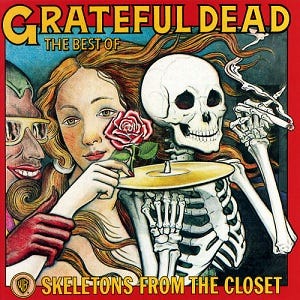
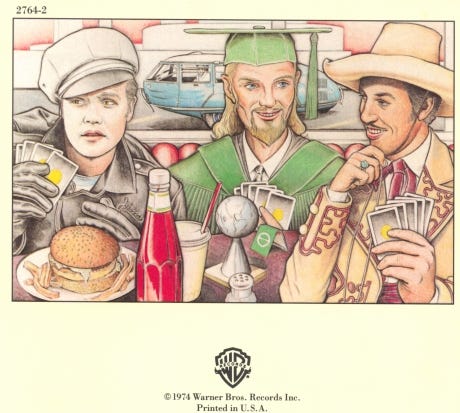
The next day when I got to work, we had lots of talk about Phil. We compared the shows or songs that we’d listened to the night before. It should not shock you, this overlap of Deadheads and grocery store employees. We walk among you, stumbling stereotypes.
My friend, the one I’d texted, had listened to Fallout From The Phil Zone, a hand-picked collection by Lesh himself.
I needed to find a different day, another October 25th where Phil Lesh was still playing. So, Sara and I listened to the Dead’s 10-25-1973 show, which is one of only two shows the Grateful Dead ever played on October 25th.
It’s not really important that you know that, but rather that the fact is known at all. Herein lies a large part of the power and influence that the Grateful Dead continues to maintain in contemporary life. Nearly every note the band ever played in front of an audience was recorded, disseminated widely by fans for decades, archived and preserved, and, eventually, uploaded to the internet.
That despite whatever Deadhead tropes you’ve heard, some of which I can report are true. Somehow they’ve still been able to compile and maintain the largest complete library of recorded music by a single group.
And remember: they did it stoned.
Try this exercise: Type a random date into your chosen search engine. Do it that way, with the numbers and keep the date before August 9, 1995. (The day Jerry Garcia died.) I’d bet both my right arm and my last dollar that a Grateful Dead concert corresponding to that date appears on the first page of results, if not in the top three.
Such is the technological prevalence of the Grateful Dead in 2024, that they’ve commandeered the very digital record of our days for the better part of forty calendar years. Even the side projects of the band’s individual members have been captured and cataloged.
I can even show you what I heard the only time I saw Phil Lesh play live. It was 11-20-2011. I can see the date listed here on the back of my tie-dye tour shirt. I was far better back then, I think. Wistful.
Somehow I convinced my boss to park the produce truck outside the Fabulous Fox Theatre in St. Louis for three hours and join me inside for two sets of Furthur, one of the numerous “after-Jerry” bands that have continued touring for the last 30 years in the wake of his departure. This was a place used to staging James Taylor and elaborate productions of The Nutcracker. It didn’t stand a chance.
After the show, we went down to Produce Row, loaded all the requisite produce for another unavoidable and fast approaching Turkey Day, and drove home along the river straight on into the next day.
Phil Lesh had been playing close to his home up until last month, still searching for the sound, even at the very end. It seems important to note also that the word “jam band” was added to the dictionary earlier this month, a feat not possible without Phil Lesh and the rest of the Grateful Dead because the word lacked a meaning before they came along.
The fact that I’ve spent more of my life listening to the Grateful Dead than any other music isn’t a unique character trait. Many people have lived this very kind of way over the last few decades in America. It’s nearly traditional at this point, and in my view, it is an admirable, if naive endeavor to fill the space of the many small rooms of our lives. It can provide a way of remembering, providing an adaptive structure to otherwise forgotten days.
Days between. That’s what they are. The days between. And I’ve spent the last two deep in the Phil Zone. While there have been countless Jerry Garcia disciples, and even some Bob Weir acolytes, I’ve heard very few people who could play bass like Phil Lesh did.
The only one I’ve seen in person was a guy who stood on a farm trailer and played in white New Balance sneakers. He came into the store not that long ago. I told him that he “nailed Phil.”
He shook my hand, and said, “That really means a lot. Call me Uncle Ed.”
Phil’s playing only ever pointed forward, and started around the fifth fret. Listen for just a little while to any stretch of a Dead show and you will find that Phil Lesh was always the wild, beating heart of a band that never stopped playing.
I’m particularly keen on Grateful Dead shows that were taped closest to the Phil Zone, which officially means “an area directly in front of the bass amps onstage where some fans would stand, feeling the full-impact of the vibrations of Lesh's bass-playing.”
If there is a spiritual core of the Grateful Dead, it is “Dark Star.” There is a really magnificent and far out theory in Deadhead culture that insists that the song “Dark Star” is always playing somewhere out there in the universe, and that the Grateful Dead just chose times to tune in to it. To pull it out of the ether. To channel it.
Sometimes the band took years between performances, especially towards the end. Phil always kicked it off.
If you really want to understand the genius of Phil Lesh, start with this suite from that other October 25. The one in 1973. This “Dark Star” isn’t on this list of the eighteen greatest versions of “Dark Star,” but it should be.
Throughout, Lesh guides the group from section to section of sometimes formless music, but it is a music that is never lost. Even at its strangest points, still Lesh is charting the course.
You don’t have to give in to it, but I do believe that “Dark Star” is playing right now. I mean I know it is playing here, through my laptop speakers as I write this. But it’s also playing back there in 1973, and it’s being played tonight by some band in some bar on the coast.
To me, that’s the real Phil Zone, some place between then and now, definitely a Sunday show with a spot by the stage, drifting right along the weird edge of America, falling and rising with the sound of the Grateful Dead.
Fare thee well, Phil.
Thanks for always steering the ship.
It's just a box of rain, I don't know who put it there
Believe it if you need it or leave it if you dare
And it's just a box of rain, or a ribbon for your hair
Such a long, long time to be gone and a short time to be there
The Five and Dime is member of the Iowa Writers’ Collaborative, where each week a slew of new writing appears from around the state. It is gracefully collected by Julie Gammack, and published here:

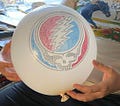


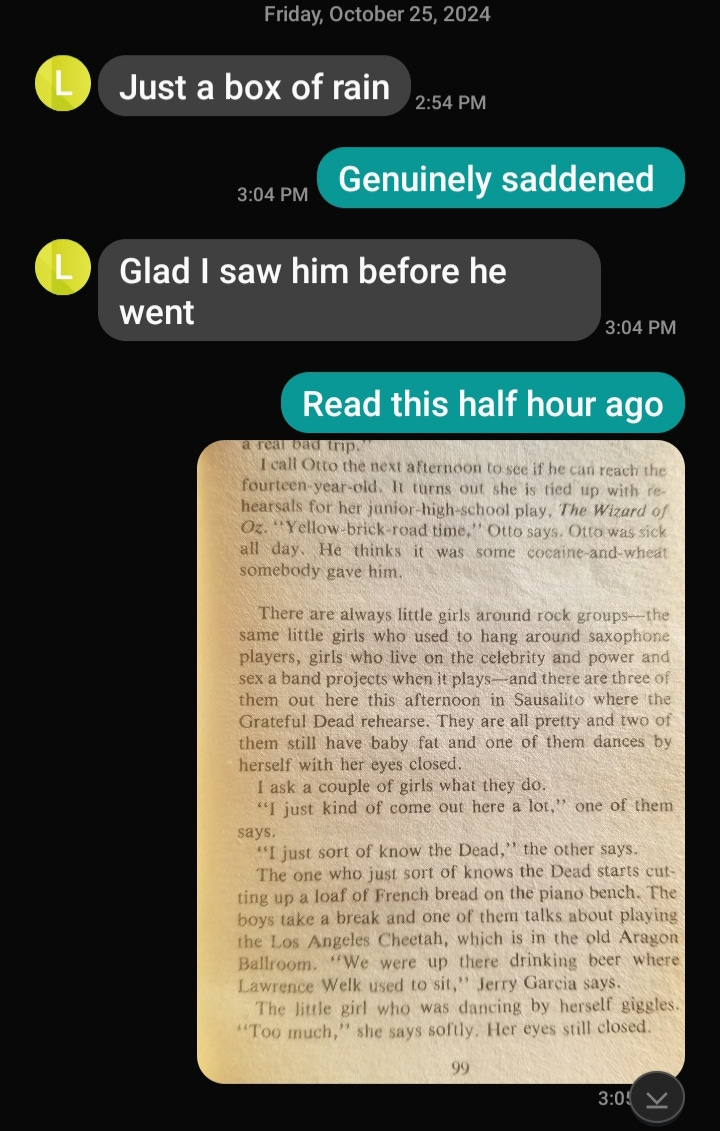
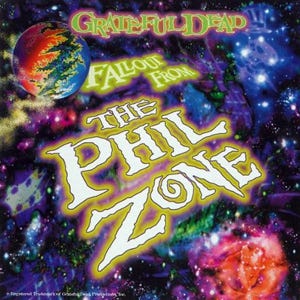
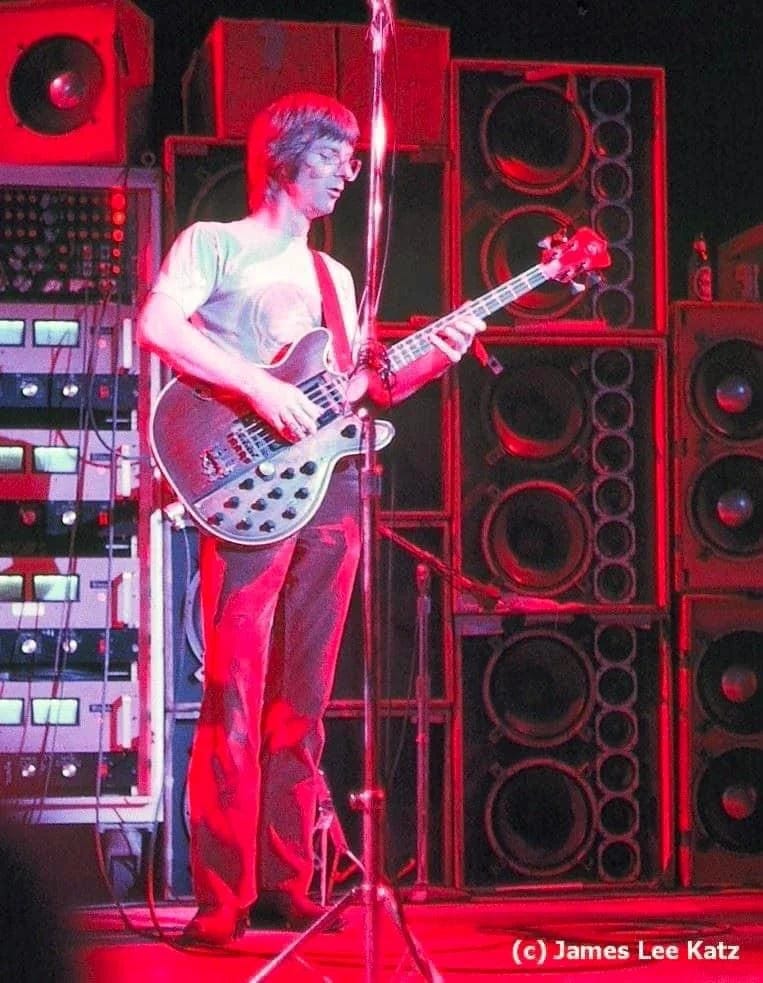
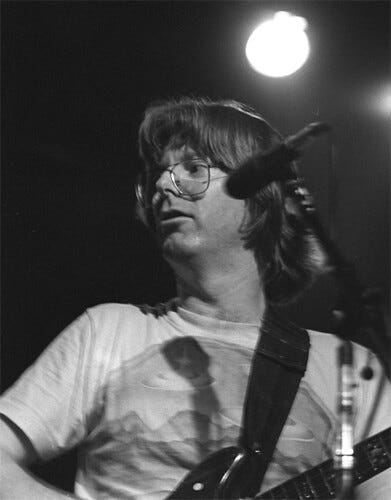
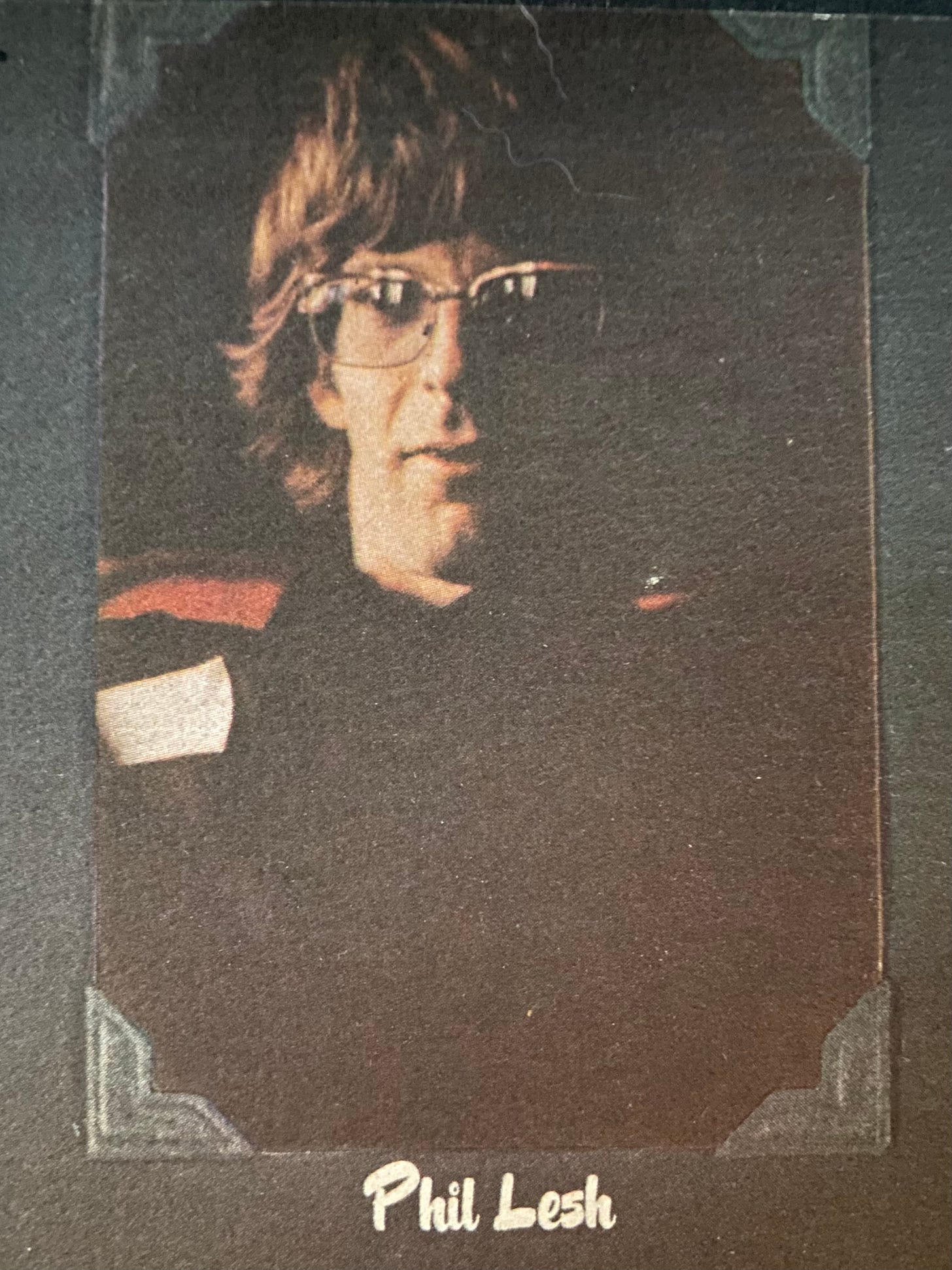
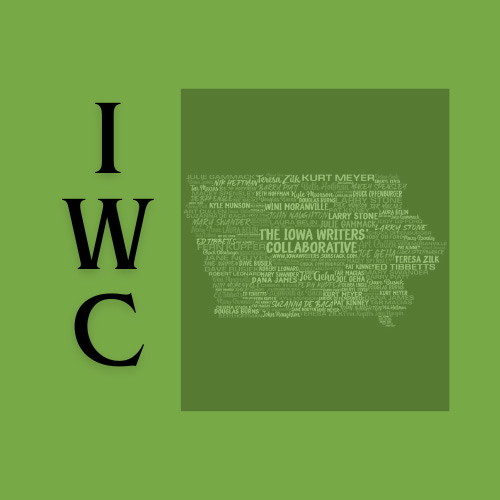
Great piece!
I met Phil Lesh and his wife Jill in 1987 when I adopted a Rottweiler they owned. They gave it away because it had become too protective of their new baby. They were afraid it would chew up any Deadheads who might try an uninvited visit to their San Rafael home.
I didn't know who he was, and the dog trainer who facilitated the handoff warned me not to be too assertive managing my own dog in front of them because, "these people are wimps." I'd been yelling at my rambunctious Giant Schnauzer before they arrived, which is why the trainer had given me that warning about not commanding my dog in such a loud voice.
Her warning set the stage for me to wonder what kind of wimps were going to give me their thousand-dollar dog. When they arrived in their new Jeep Cherokee with an infant and a Rottweiler inside, it was obvious that theirs was something of a May-December relationship.
I told the man, Phil, that I liked to wrestle with big dogs. I already owned one myself, the schnauzer which I had brought along to make sure it could accept his Rottweiler. Phil said, "I can't do that," and I wondered why. One of the trainer's employees asked him deferentially, "Because of your hands?"
So I asked this rather large wimp man, thinking that he might be a surgeon or something, "What do you do?"
"I'm a bass player," he said.
Well that gave me pause to think. A bass player with a nice vehicle, a much younger wife and baby, giving away a thousand-dollar dog...well who could that be?
"I play for the Grateful Dead," he said, "with the band from the beginning."